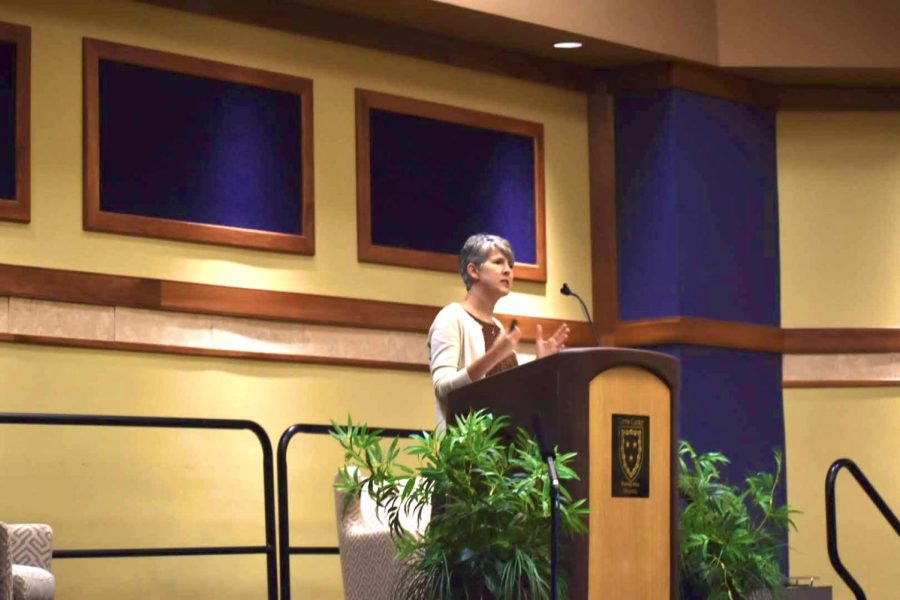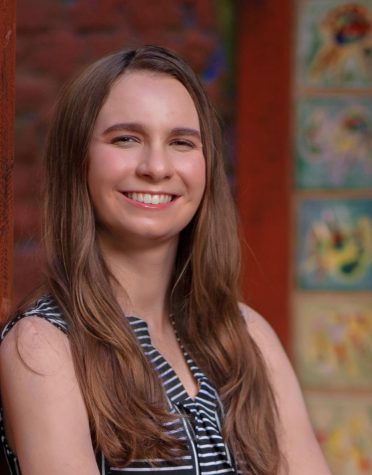Easley lecture sheds light on women’s suffrage
Goan focused on Kentucky women’s fight for the vote at the annual Sid Easley lecture on Thursday, Sept. 22. (Mary Huffman/The News)
September 28, 2022
Visiting lecturer Melanie Beals Goan spoke about her book, “A Simple Justice: Kentucky Women Fight for the Vote.”
The lecture, held in the Curris Center Ballroom on Thursday, Sept. 22, introduced attendees to some of the lesser-known figures who made suffrage possible.
The event marked the fifth annual Sid Easley Lecture. Easley, a late alumnus of the University, served as Board of Regents chairman and was the first recipient of the Golden Horseshoe Award.
Upon Easley’s passing in 2016, his family established the free guest lecture series to honor his legacy of supporting the Department of History.
In her lecture, Goan said a wave of scholarship has emerged following the 100th anniversary of the 19th Amendment.
“What role did Kentucky women play in the fight for the vote?” Goan said. “Why does Kentucky matter in this national story? It matters more than you might think.”Kentucky women were some of the first to vote in the nation, with some participating in school elections as early as 1838. Though this right was later revoked in 1902 over fears that Black women would sway results, the national struggle for suffrage often looked to Kentucky for guidance.
Goan said we should celebrate the 19th Amendment while remaining mindful of its limitations.
“Not all women are going to vote after 1920, especially African American women in Southern states…but also Asian women, immigrant women, Native American women,” Goan said.
Nevertheless, Goan said it is important to focus on local stories about the fight for suffrage
“Understanding it on the state and local level helps us get in the trenches with women,” Goan said.
The lecture shed light on some of Kentucky’s most influential figures in the movement, including Laura Clay, Josephine Henry and Mary Britton. These women emerged from different backgrounds and advocated various approaches, with the more conservative Clay opposing federal action and the latter two supporting it.
Goan is a professor at the University of Kentucky, where she specializes in 20th century U.S. history with specific interests in gender, Kentucky, the region of Appalachia and history of medical practices. She earned her doctorate and master’s degrees from the University of Kentucky and her bachelor’s degree from Slippery Rock University in Pennsylvania.
In addition to her recent book, Goan is the author of “Mary Breckenridge: The Frontier Nursing Service and Rural Health in Appalachia,” as well as numerous articles, essays and other publications. She received the Teachers Who Made a Difference Award in 2018 and the University of Kentucky Provost’s Outstanding Teaching Award in 2017, among other honors.
Olga Koulisis, assistant professor who specializes in U.S. history, said she found the lecture fascinating.
“I teach this stuff, and it was really nice to hear some more details about women’s suffrage in Kentucky and hearing some of the key players,” Koulisis said.
Koulisis said the talk also spoke on how racism has played a role in preventing politics from moving forward.
“Now, we tend to like intersectional feminism and trying to get all women internationally to work toward greater rights,” Koulisis said.
Marjorie Hilton, professor of history who focuses on Russia and the Soviet Union, said she was less familiar with the subject matter.
“In one of my world history classes the other day, we were talking about the Haitian Revolution, and in the Constitution, it says a man will lose his citizenship for various reasons [like bankruptcy or emigration],” Hilton said. “They were just appalled, so I can’t wait to go back and tell them that right here in the United States, there was a similar kind of suspicion of foreigners… It helps me understand even the world better.”
At the end of the lecture, Goan provided some takeaway lessons from the given historical context.
“It reminds us that the vote is not guaranteed,” Goan said. “We have to be vigilant today in 2022… Limiting voting hours, efforts to clean up the voting rules, all of these things still threaten to silence American voters today.”
Donations to support the Sid Easley Lecture can be made at murraystate.edu/giving or by check made payable to the Murray State University Foundation and mailed to the Murray State Office of Development at 200 Heritage Hall, Murray, KY 42071.





























































































